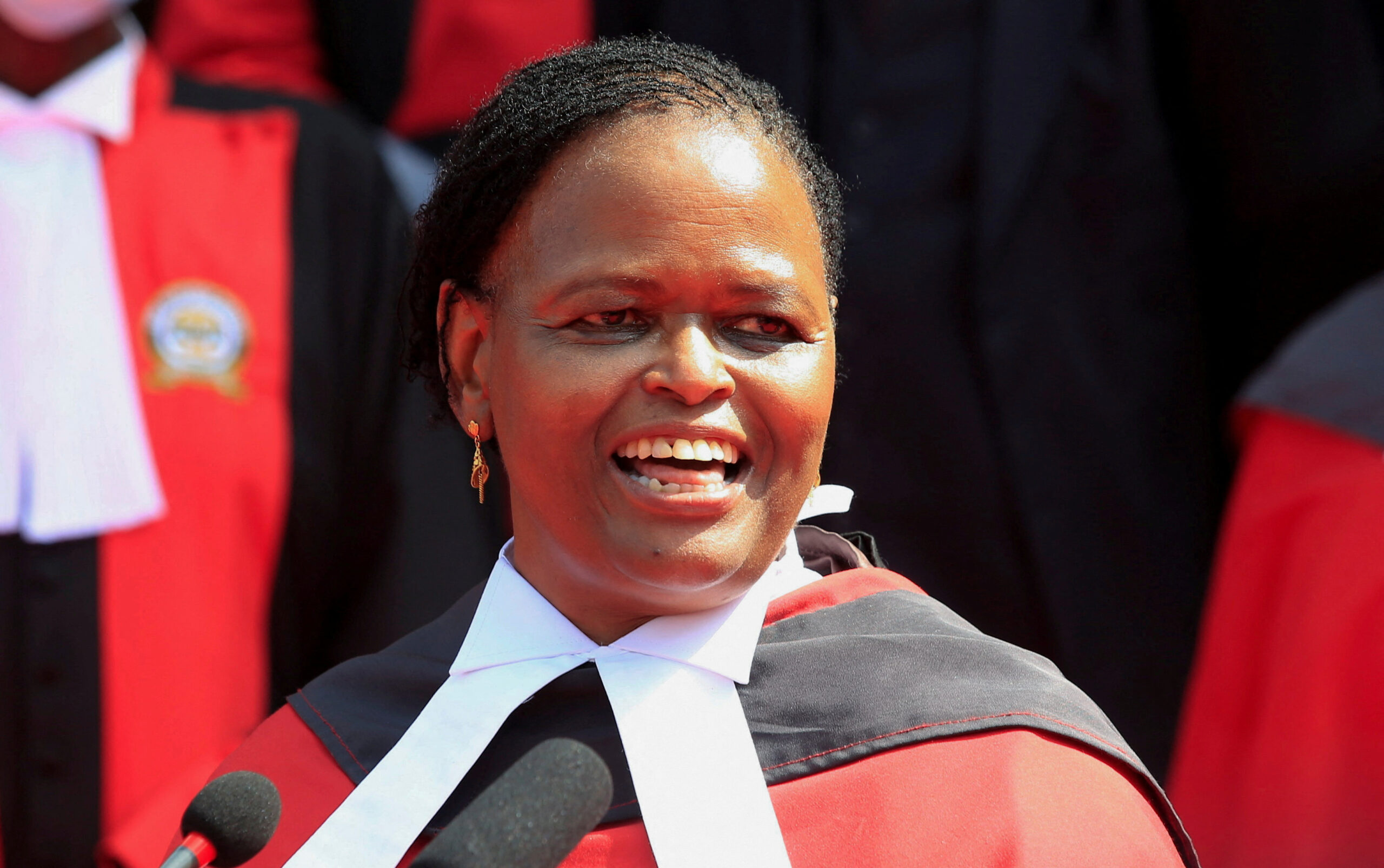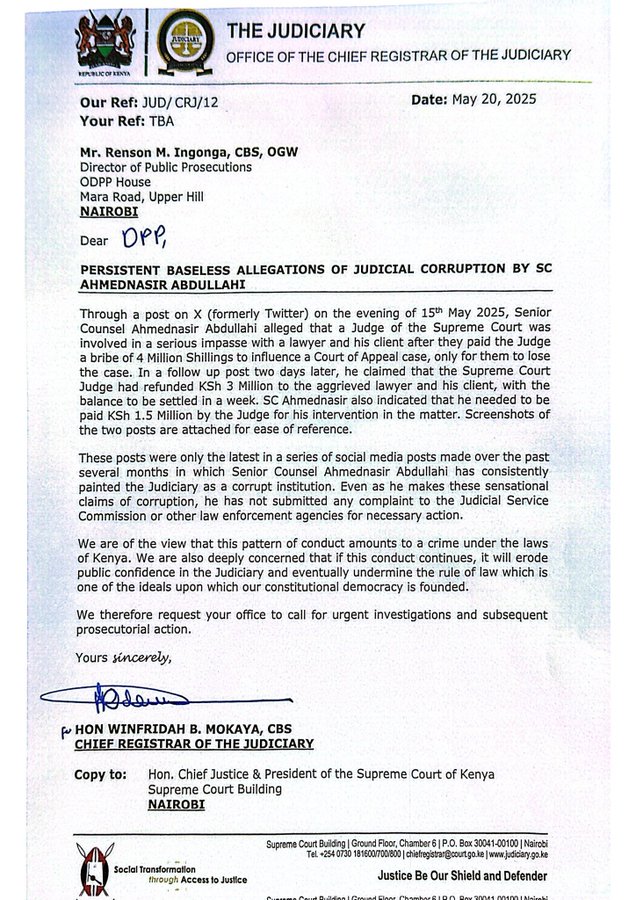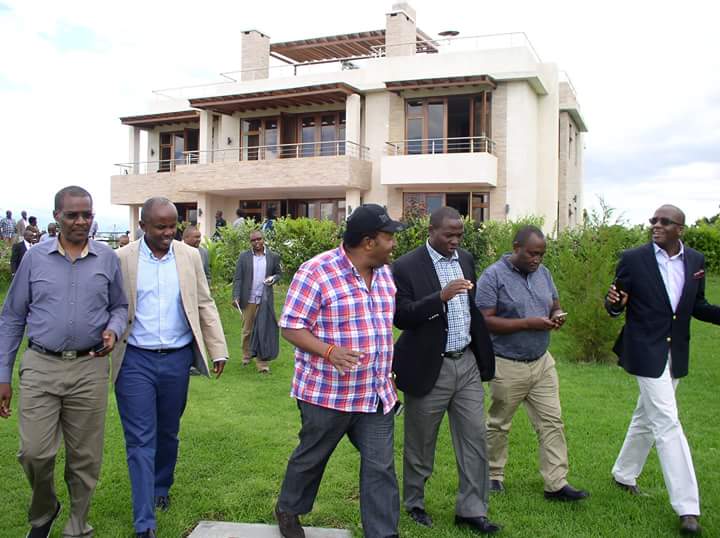Senior Counsel Ahmednasir Abdullahi is known for his outspoken and fearless opinions. But his latest corruption claims have triggered a dramatic reaction from the Judiciary.
Now, the country watches closely as the Chief Registrar of the Judiciary, Winfridah Mokaya, demands a full probe — and possibly the arrest — of the vocal lawyer.
At the center of the storm is a multi-million shilling bribery accusation involving a Supreme Court judge, a mysterious refund, and growing concerns about the rule of law. The heat is on, and this time, Ahmednasir may not walk away untouched.

Why Ahmednasir Abdullahi May Soon Face Arrest Over Explosive Bribery Allegations
Kenya’s Judiciary has taken a bold and unprecedented step. In a letter dated May 20, Chief Registrar Winfridah Mokaya called on the Office of the Director of Public Prosecutions (ODPP) to open an investigation into Ahmednasir Abdullahi.
The move follows a series of public allegations made by the lawyer against sitting judges. The most explosive? Ahmednasir claimed that a Supreme Court judge received a Ksh4 million bribe to sway a ruling in the Court of Appeal.
The case, according to Ahmednasir, didn’t go as planned for the bribing party. He alleged that when the litigant still lost, the judge returned Ksh3 million — and was due to refund the balance soon. The lawyer posted these details publicly, reigniting questions about deep corruption in Kenya’s judicial system.
But instead of launching an internal probe into the judge, the Judiciary turned its guns on Ahmednasir. In her letter to DPP Renson Ingonga, Mokaya argued that the lawyer’s conduct amounted to criminal behavior. She accused him of undermining the Judiciary through unsubstantiated claims.
“This pattern of conduct amounts to a crime under the laws of Kenya,” the letter stated. Mokaya added that if left unchecked, Ahmednasir’s statements could erode public trust and damage the Judiciary’s credibility beyond repair.

Ahmednasir Responds with Defiance and Counterclaims
True to form, Ahmednasir did not back down. On X (formerly Twitter), the seasoned lawyer dismissed Mokaya’s letter as a “clumsy cover-up.” He claimed that instead of seeking justice against the corrupt judge, the Judiciary had chosen to silence a whistleblower.
“Instead of investigating the Supreme Court Judge who took a bribe of Ksh6 million, she has the audacity to ask for my apprehension,” Ahmednasir posted. He also raised questions about the legitimacy of Mokaya’s letter, noting that it was unsigned.
The lawyer went further, blaming the Judiciary for its own sinking reputation. “It is the incompetence and graft leadership of the Judiciary that erodes public confidence… not cries for a graft-free judiciary,” he stated.
These bold statements have split public opinion. Some view Ahmednasir as a necessary disruptor. Others accuse him of recklessly attacking state institutions without evidence.
Judiciary Struggles to Restore Its Image Amid Mounting Pressure
This incident comes at a sensitive time. Kenya’s Judiciary has faced increased criticism over corruption, delayed cases, and questionable rulings. Chief Justice Martha Koome recently acknowledged the public’s waning faith in the system.
In response, Koome announced the formation of court integrity committees at every court station. These committees aim to bring together judges, lawyers, and anti-corruption officials to monitor ethical standards and respond to complaints.
However, these reforms may not be enough to repair the damage. With Ahmednasir’s allegations now grabbing national headlines, public trust is once again on shaky ground.
If the DPP agrees to investigate Ahmednasir, it will open a legal showdown unlike any other. But if the Judiciary fails to act on the bribery claims he raised, it risks appearing complicit — or worse, protective of corrupt judges.











































